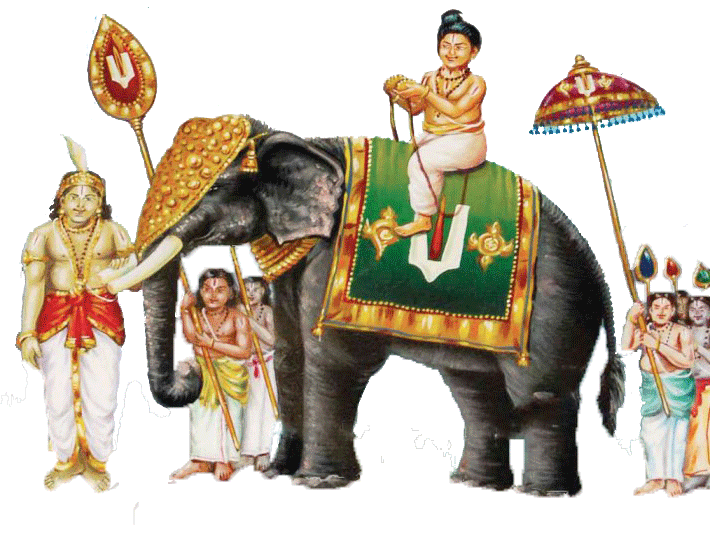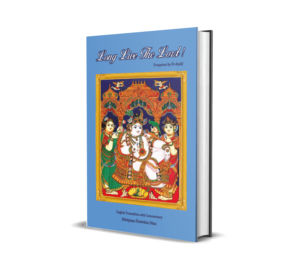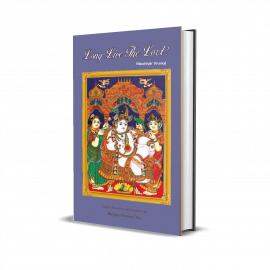Publications
Śrī Āṇḍāḷ's Divine Rendition
Pronunciation of Sanskrit words
Vowels in Sanskrit are pronounced almost as in Italian. The sound of the short ‘a’ is like the u in but, the long ā is like the ‘a’ in far and held twice as long as the short a, and e is like the ‘a’ in evade. Long ‘ī’ is like the ‘i’ in pique. The vowel ‘ṛ’ is pronounced like the ‘re’ in the English word fibre. The ‘c’ is pronounced as in the English word chair, and the aspirated consonants (ch, jh, dh, etc.) are pronounced as in staunch-heart, hedge-hog, red-hot, etc. The two spirants ‘ś’ and ‘ṣ’ are pronounced like the English ‘sh’; ‘s’ is pronounced as in sun. Thus Kṛṣṇa is pronounced KRISHNA, Caitanya is pronounced CHAITANYA, etc.
Pronunciation of Tamil words
Vowels
English | Tamiḻ/As sound of |
a | அ/“a” in ‘alloy’, ‘adieu’ {short ‘a’};as in “butter’, ‘utter’. |
ā | ஆ/”a” in “arm’, ‘art’, ‘bark’ {long a} |
I | இ/“i” in ‘rip’, ‘pick’ {short i} |
ī | ஈ/“i” in ‘skiing’, “e” in ‘peep’, ‘eat’ {long i} |
u | உ/“u” in ‘push’, ‘pull’ {short u} |
ū | ஊ/”o” in “boot’, ‘proof’, as “u” in ‘true’, “rude’ {long u} |
e | எ/“e” in ‘economics’, ‘end’, ‘came’, ‘take’. |
ē | ஏ/“ae” in ‘aeroplane’ or “ay” in ‘pray’. |
ai | ஐ/”ai” in ‘aisle’, ‘ice’, ‘idea’. |
o | ஒ/”o” in ‘go’, ‘low’. {short o} |
ō | ஓ/“o” in ‘Over’, ‘Omen’ {long o} |
au | ஔ/”ow” in ‘cow’ |
ag | ஃ/”ach” in ‘stomach’. When used before a letter say “pa”—pronounced as ‘fa’ |
Consonants
k, g | க்/“k” in “back”, “pack”; “g” in ‘gum’ |
ṅ | ங்/“ing” in ‘wing’, ‘tring’; “ng”in ‘Kangaroo’ |
c,j | ச்/“ch” in ‘chin’, ‘approach’; “j” in ‘justice’ |
ñ | ஞ்/“inj” in ‘brinjal; ‘jñāna’ |
ṭ, ḍ | ட்/”it” in ‘it’, ‘beť, ‘tub’; “d” in ‘dust’ |
ṇ | ண்/as ‘n’ in ‘Under’, ‘Wander’ |
t, d | த்/“th” in ‘bath’, ‘thick’, author; “dh” in ‘dharma’ |
n | ந்/“n” in ‘month’, ‘enthusiasm’; “n” in ‘nut’ |
p, b | ப்/“p” in ‘tip’, ‘cup’, ‘pun’; “b” in ‘bus’ |
m | ம்/“m” in ‘slam’, ‘mom’, ‘must’ |
y | ய்/’y’in ‘boy’, ‘young’ |
r | ர்/“r” in ‘river’ {light r}, ‘run’ |
l | ல்/“l” in “travel’. {light l}, ‘luck’ |
v | வ்/“v” in ‘van’, ‘vacate’ |
ḻ | ழ்/as the outdated ‘zh’ |
ḷ | ள்/“l” in “plum’. Tip of tongue to touch roof of mouth |
ṛ | ற்/Hard “r” as in ‘mirror’, ‘error’, ‘crush’ |
ṉ | ன்/“in” in ‘pin’ {light n}; ‘tenant’ |
Letters from other languages
j | ஜ்/“j” in ‘taj’ and ‘ge’ in ‘bridge’ |
Śrī | ஸ்ரீ/shri in ‘shriek’ |
ś | ஷ்/sh in ‘shark’ |
s | ஸ்/s in ‘bus’, ‘safari’ |
ha | ஹ/’h’ in ‘hut’, ‘hum’ |
ksha | க்ஷ/’ksh’ in ‘bookshop’, ‘workshop’. |
Compound Letters
Vowels combine with the sounds of consonants to make compound alphabets, some of which have multiple pronunciations:.
ṉa | ன/ ‘na’ in ‘tenant’ |
pa, ba | ப/ ‘pa’ in pun, ‘ba’ in ‘bus’ |
Frequently Occurring Consonant Clusters
ṅga | ங்க/’nga’ in ‘Ganga’ |
ñja | ஞ்ச/’nja’ in ‘tinge’ ‘Ninja’ |
ṉḍṛa | ன்ற/‘ndra’, in the name ‘tundra’ |
mba | ம்ப/ ‘mbo’ in the word ‘symbol’ |
ṇḍa | ண்ட/ ‘nde’ in the name ‘thunder’ |
ndha | த்த/ ‘ndha’ in ‘panther’ |
ṭṛṛa | ற்ற/ ‘tra’ in ‘etcetra’ |
Book titles and guide to references
Śri Brahma-samhitā 5.56:
Śrī Brahma-samhitā, Ch. 5, Verse 56
Gītā 11.33:
Bhagavad-gitā, Ch. 11, Verse 33
Back to Godhead # 31-06, 1997:
Back to Godhead Magazine, Vol. 31, No.6, 1997
Śrī Caitanya-caritāmsta Ādi 9.10:
Śrī Caitanya-caritāmộta, Adi-līlā, Ch. 9, Verse 10
Śrī Caitanya-caritāmộta Madhya 19.151:
Śrī Caitanya-caritāmộta, Madhya-līlā, Ch. 19, Verse 151
Śrī Caitanya-caritāmsta Antya 8.34:
Śrī Caitanya-caritāmộta, Antya-lilā, Ch. 8, Verse 34
Jaiva Dharma 10:
Jaiva Dharma, Ch. 10
Krsna, The Supreme Personality of Godhead 21:
Krşņa, The Supreme Personality of Godhead chapter 21
Mundaka Upanișad 1.2.12:
Mundaka Upanişad Canto 1, Ch. 2, Verse 12
Nectar of Devotion 34: The Nectar of Devotion, Ch. 34
Path of Perfection 10: Path of Perfection, Ch. 10
Bhāgavatam 1.3.28: Srimad-Bhāgavatam, Canto 1, Ch. 3, Verse 28
Surrender unto Me 9.22: Surrender unto Me, Gītā Ch.9, Verse 22
Teachings of Lord Kapila 14.32, purport:
Teachings of Lord Kapila, Ch. 14, Verse 32


© Quotes from His Divine Grace A. C. Bhaktivedanta Swami Prabhupāda are copyrighted by Bhaktivedanta Book Trust-International.


